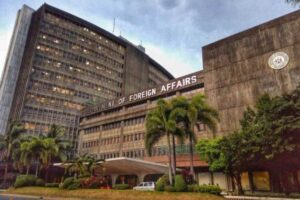THE DEPARTMENT of Foreign Affairs (DFA) on Thursday said it will work with Philippine law enforcement agencies to probe alleged Chinese espionage operations in the country.
“The Department takes any indication of espionage operations by foreign nationals seriously and stands ready to support the Department of Justice, the National Bureau of Investigation (NBI) and the Armed Forces of the Philippines (AFP) and other relevant government agencies…” it said in a statement.
A Chinese national suspected of being a spy was arrested on Tuesday after law enforcers recovered alleged military spying equipment from him.
The Chinese national and two Filipino cohorts were arrested in a condominium in Makati City, with the NBI filing an espionage complaint against them in connection with cybercrime before the Justice department.
AFP Chief of Staff Romeo S. Brawner, Jr. earlier said the material could have been used for military targeting purposes, as the items could create three-dimensional images for guided missile systems.
“The Chinese government as always, asks Chinese nationals overseas to abide by local laws and regulations,” Chinese Foreign Ministry spokesperson Mao Ning told a news briefing in Beijing late Wednesday.
“We hope the Philippines will stick to the facts, stop shadow-chasing, stop peddling the so-called ‘Chinese spy,’ and earnestly protect the lawful rights and interests of Chinese nationals in the Philippines.”
ANTI-ESPIONAGE BILLSThis also prodded a lawmaker to push the House of Representatives to immediately act on pending anti-espionage bills in the chamber, which proposed to expand activities that constitute spying and impose sanctions even in times of peace.
“With this development of arrested spies, [I] will ask [the] House Leadership to fast track these bills,” Cagayan de Oro Rep. Rufus B. Rodriguez, a member of the House national defense and strategic intelligence committees, told BusinessWorld in a Viber message.
The suspected spies were accused of traveling to locations, under the Enhanced Defense Cooperation Agreement, on the main Philippine island of Luzon, using topographical equipment that could map out the structures and provide global positioning coordinates of the military sites.
“The arrest of these suspected Chinese and Filipino spies should prompt Congress to immediately pass bills that would expand the coverage of the crime of espionage,” Mr. Rodriguez said in a separate statement.
Philippine Defense Secretary Gilberto Eduardo C. Teodoro, Jr. and National Security Advisor Eduardo M. Año have separately called lawmakers to pass stiffer penalties against spying, highlighting growing concerns over Manila’s vulnerabilities to espionage by the defense establishment.
“We have not heeded the appeal of our Defense secretary. We have not addressed concerning developments in the area of spying and we have not updated our law since 1941, more than 80 years ago,” said Mr. Rodriguez.
The lawmaker filed last year House Bills (HBs) No. 10983 and 10988, with both seeking to strengthen Philippine regulations against spying.
HB No. 10983 seeks to amend Article 117 of the Revised Penal Code to allow the sanction of prision correccional, which has a duration of one day to six years, even when the act of espionage is committed during peacetime.
Meanwhile, HB No. 10988 expands the coverage of espionage under the 83-year-old Anti-Espionage Act. The bill seeks to include the act of unlawfully obtaining and sharing “classified matter or classified information affecting national defense or national security” of the Philippines as punishable by law. — John Victor D. Ordoñez and Kenneth Christiane L. Basilio
